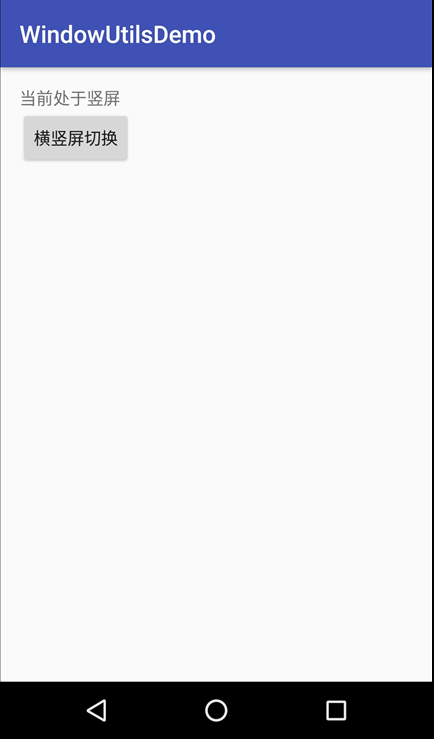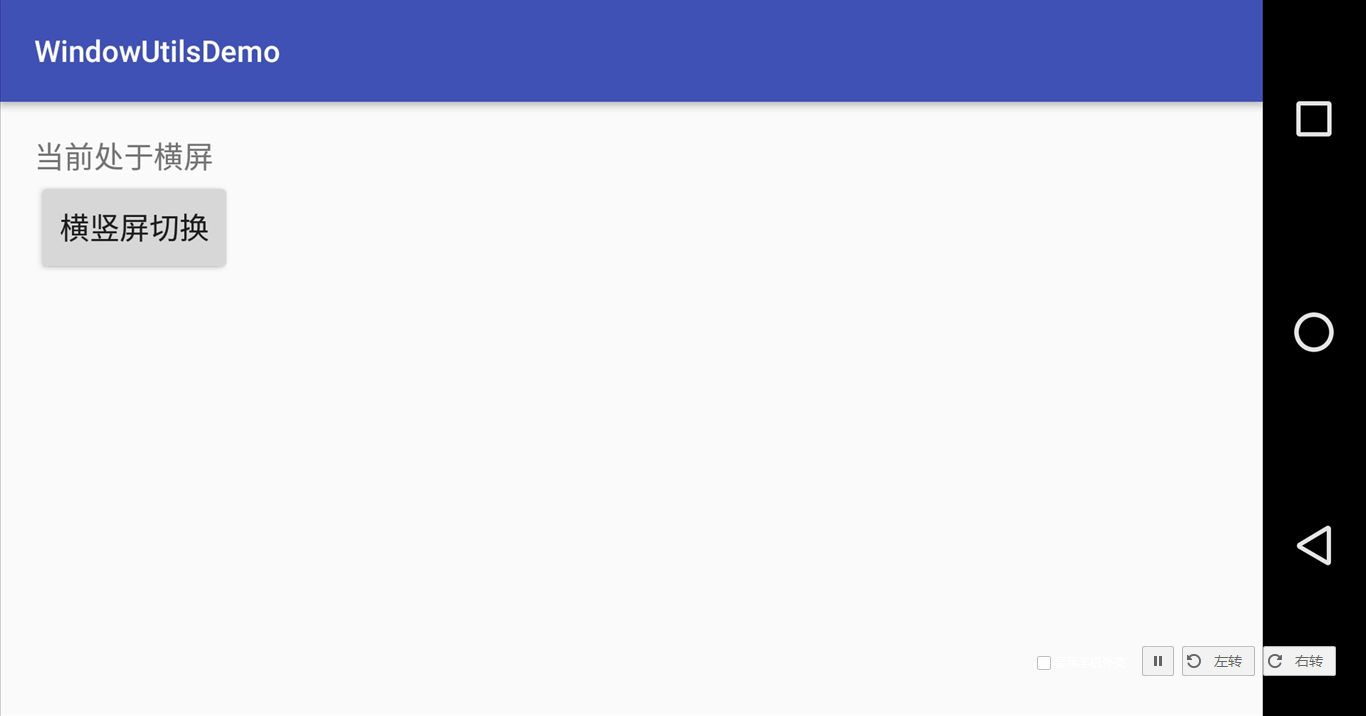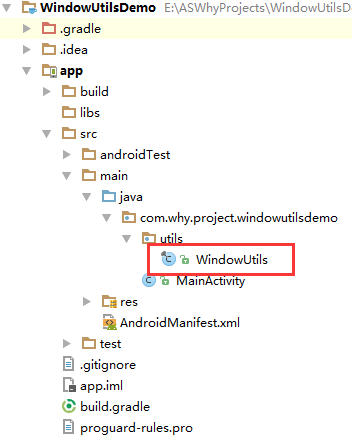WindowUtils【窗口工具类】
版权声明:本文为HaiyuKing原创文章,转载请注明出处!
前言
判断当前界面是横屏还是竖屏;
获取当前界面方向。
效果图


代码分析
isLandscape(Context context): 判断是否横屏
isPortrait(Context context): 判断是否竖屏
getScreenOrientation(Activity activity): 获取界面方向
使用步骤
一、项目组织结构图

注意事项:
1、导入类文件后需要change包名以及重新import R文件路径
2、Values目录下的文件(strings.xml、dimens.xml、colors.xml等),如果项目中存在,则复制里面的内容,不要整个覆盖
二、导入步骤
将WindowUtils复制到项目中
package com.why.project.windowutilsdemo.utils; /** * Copyright 2014 Zhenguo Jin (jinzhenguo1990@gmail.com) * <p> * Licensed under the Apache License, Version 2.0 (the "License"); * you may not use this file except in compliance with the License. * You may obtain a copy of the License at * <p> * http://www.apache.org/licenses/LICENSE-2.0 * <p> * Unless required by applicable law or agreed to in writing, software * distributed under the License is distributed on an "AS IS" BASIS, * WITHOUT WARRANTIES OR CONDITIONS OF ANY KIND, either express or implied. * See the License for the specific language governing permissions and * limitations under the License. */ import android.animation.ValueAnimator; import android.app.Activity; import android.content.Context; import android.content.pm.ActivityInfo; import android.content.res.Configuration; import android.util.DisplayMetrics; import android.view.Surface; import android.view.Window; import android.view.WindowManager; /** * 窗口工具箱 * * @author zhenguo */ public final class WindowUtils { /** * Don't let anyone instantiate this class. */ private WindowUtils() { throw new Error("Do not need instantiate!"); } /** * 获取当前窗口的旋转角度 * * @param activity activity * @return int */ public static int getDisplayRotation(Activity activity) { switch (activity.getWindowManager().getDefaultDisplay().getRotation()) { case Surface.ROTATION_0: return 0; case Surface.ROTATION_90: return 90; case Surface.ROTATION_180: return 180; case Surface.ROTATION_270: return 270; default: return 0; } } /** * 当前是否是横屏 * * @param context context * @return boolean */ public static final boolean isLandscape(Context context) { return context.getResources().getConfiguration().orientation == Configuration.ORIENTATION_LANDSCAPE; } /** * 当前是否是竖屏 * * @param context context * @return boolean */ public static final boolean isPortrait(Context context) { return context.getResources().getConfiguration().orientation == Configuration.ORIENTATION_PORTRAIT; } /** * 调整窗口的透明度 1.0f,0.5f 变暗 * * @param from from>=0&&from<=1.0f * @param to to>=0&&to<=1.0f * @param context 当前的activity */ public static void dimBackground(final float from, final float to, Activity context) { final Window window = context.getWindow(); ValueAnimator valueAnimator = ValueAnimator.ofFloat(from, to); valueAnimator.setDuration(500); valueAnimator.addUpdateListener( new ValueAnimator.AnimatorUpdateListener() { @Override public void onAnimationUpdate(ValueAnimator animation) { WindowManager.LayoutParams params = window.getAttributes(); params.alpha = (Float) animation.getAnimatedValue(); window.setAttributes(params); } }); valueAnimator.start(); } /** * 获取界面方向 */ public static int getScreenOrientation(Activity activity) { int rotation = activity.getWindowManager().getDefaultDisplay().getRotation(); DisplayMetrics dm = new DisplayMetrics(); activity.getWindowManager().getDefaultDisplay().getMetrics(dm); int width = dm.widthPixels; int height = dm.heightPixels; int orientation; // if the device's natural orientation is portrait: if ((rotation == Surface.ROTATION_0 || rotation == Surface.ROTATION_180) && height > width || (rotation == Surface.ROTATION_90 || rotation == Surface.ROTATION_270) && width > height) { switch (rotation) { case Surface.ROTATION_0: orientation = ActivityInfo.SCREEN_ORIENTATION_PORTRAIT; break; case Surface.ROTATION_90: orientation = ActivityInfo.SCREEN_ORIENTATION_LANDSCAPE; break; case Surface.ROTATION_180: orientation = ActivityInfo.SCREEN_ORIENTATION_REVERSE_PORTRAIT; break; case Surface.ROTATION_270: orientation = ActivityInfo.SCREEN_ORIENTATION_REVERSE_LANDSCAPE; break; default: orientation = ActivityInfo.SCREEN_ORIENTATION_PORTRAIT; break; } } // if the device's natural orientation is landscape or if the device // is square: else { switch (rotation) { case Surface.ROTATION_0: orientation = ActivityInfo.SCREEN_ORIENTATION_LANDSCAPE; break; case Surface.ROTATION_90: orientation = ActivityInfo.SCREEN_ORIENTATION_PORTRAIT; break; case Surface.ROTATION_180: orientation = ActivityInfo.SCREEN_ORIENTATION_REVERSE_LANDSCAPE; break; case Surface.ROTATION_270: orientation = ActivityInfo.SCREEN_ORIENTATION_REVERSE_PORTRAIT; break; default: orientation = ActivityInfo.SCREEN_ORIENTATION_LANDSCAPE; break; } } return orientation; } }
三、使用方法
package com.why.project.windowutilsdemo; import android.content.pm.ActivityInfo; import android.os.Bundle; import android.support.v7.app.AppCompatActivity; import android.view.View; import android.widget.Button; import android.widget.TextView; import com.why.project.windowutilsdemo.utils.WindowUtils; public class MainActivity extends AppCompatActivity { private TextView tv_show; private Button btn_switch; @Override protected void onCreate(Bundle savedInstanceState) { super.onCreate(savedInstanceState); setContentView(R.layout.activity_main); initViews(); initEvents(); } @Override protected void onResume() { super.onResume(); //横竖屏切换的时候也会执行 initDatas(); } private void initViews() { tv_show = (TextView) findViewById(R.id.tv_show); btn_switch = (Button) findViewById(R.id.btn_switch); } private void initDatas() { if (WindowUtils.isLandscape(this)) { tv_show.setText("当前处于横屏"); } if (WindowUtils.isPortrait(this)) { tv_show.setText("当前处于竖屏"); } } private void initEvents() { btn_switch.setOnClickListener(new View.OnClickListener() { @Override public void onClick(View v) { toggleFullScreen(); } }); } /** * 全屏切换,点击全屏按钮 */ private void toggleFullScreen() { if (WindowUtils.getScreenOrientation(this) == ActivityInfo.SCREEN_ORIENTATION_LANDSCAPE) { this.setRequestedOrientation(ActivityInfo.SCREEN_ORIENTATION_PORTRAIT); } else { this.setRequestedOrientation(ActivityInfo.SCREEN_ORIENTATION_LANDSCAPE); } } }
混淆配置
无
参考资料
暂时空缺


 浙公网安备 33010602011771号
浙公网安备 33010602011771号